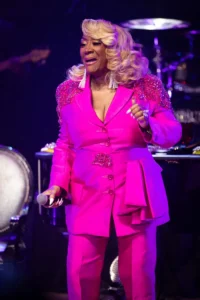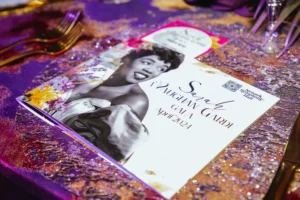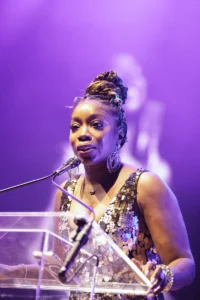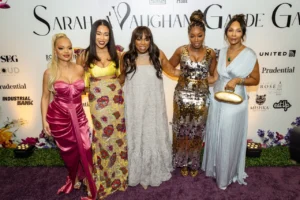ESSENCE
Intergenerational voices convene and share the impact of Sarah Vaughan on music
The historic Newark Symphony Hall was the perfect place to commemorate the 100th birthday of the trailblazing singer and pianist, Sarah Vaughan (1924-1990). Vaughan left an undeniable mark on the jazz genre of music and was a forerunner of “bebop.” Not only was the Newark, New Jersey native a winner of multiple Grammys and a Lifetime Achievement Award, but she was also inducted into the Jazz Hall of Fame. Due to her vocal control, voice agility, and ability to apply different vocal stylings, Vaughan was dubbed by the industry insiders of her time as “The Divine One” and “Sassy.” It was only fitting that the Sarah A’Vaughan Garde Gala not only showcased and honored the legacy of Vaughan, but also highlighted the current revamping of the Newark Symphony Hall and its addition of the forthcoming Arts + Education Lab. In the spirit of Vaughan, and under the leadership of Talia L. Young, President & CEO of Newark Symphony Hall, the new 30,000 square foot cultural hub “will drive economic growth in the arts, promote cultural enrichment and engage the community within Newark, New Jersey.” When speaking with ESSENCE at the evening’s gala, Young shared, “What you’re going to see tonight is a beautiful rendition of Sarah Vaughan’s songs. Yes, songs like ‘A House Is Not A Home’ which she performed first, which people think belong to Luther Vandross. We are showcasing new artists and maturing artists, and putting that music in her namesake, and blending the younger and older culture. And, I think that’s a powerful connection.” Young also added, “Once we are taught the history of music, or history in general, we can better carry on that legacy.”
The Pre-Reception Festivities
As guests made their way towards the grand entrance of the hall towards the pre-reception festivities, life-size portraits of moments in Vaughan’s life lined a lovely, lavender carpet. Nestled in the center of the grand foyer sat a large, grand piano decorated with pinkish-peach flowers, and the table tops were garnished with magenta roses and feather-like arrangements. A pianist played the piano as guests treated themselves to tasty hor d’oeuvres like crabcakes and mini shrimp and grits dishes, and countless others. Hosted by the lovely singer Estelle, the evening was a well-curated presentation that showcased the beauty of the venue, and the transcending intergenerational impact that Vaughan has made. Estelle who was perfect as the Mistress of Ceremonies briefly shared that it was artists like Sarah Vaughan who gave unconventional artists the space to be. “…especially artists who are not technically choreographed. I’m personally not choreographed [as an artist], I stand and I sing. I stand, and I perform. She gave us that space to be uniquely stylized in our own way. And, between her, Ella Fitzgerald, and Diana Ross, their vocals and performances were just elegant.”


Taylor, the Gala Chair of the night’s event, is also the goddaughter of Vaughan, and she candidly shared with ESSENCE how Vaughan’s legacy and life impacted her journey. Taylor quipped, “she spread Black Girl Magic all through the Jim Crow South,” even before the word was created-she demonstrated it. “Here is an American icon who is recording with the likes of Quincy Jones, Count Basie, Duke Ellington, and all the legends. Then, in Europe, getting the red carpet experience and coming back to America in the Jim Crow South and having to enter the venues where she entertained through the back door…having to use the Green Book to have a safe place to stay.” Taylor further shared, “I remember stories like my mother telling me that if they went to a restaurant, some of the band members were white, and if they [the Black musicians] couldn’t eat there [in the restaurants], the white band members wouldn’t eat there either. And, that called for a lot of fortitude, tenacity, and of understanding your value. And, not allowing anyone else to validate the gifts that you brought. For me, growing up in the face of strong women like that, and certainly here in Newark, the city of my birth, it said a lot to me about the truth of who we are.”


